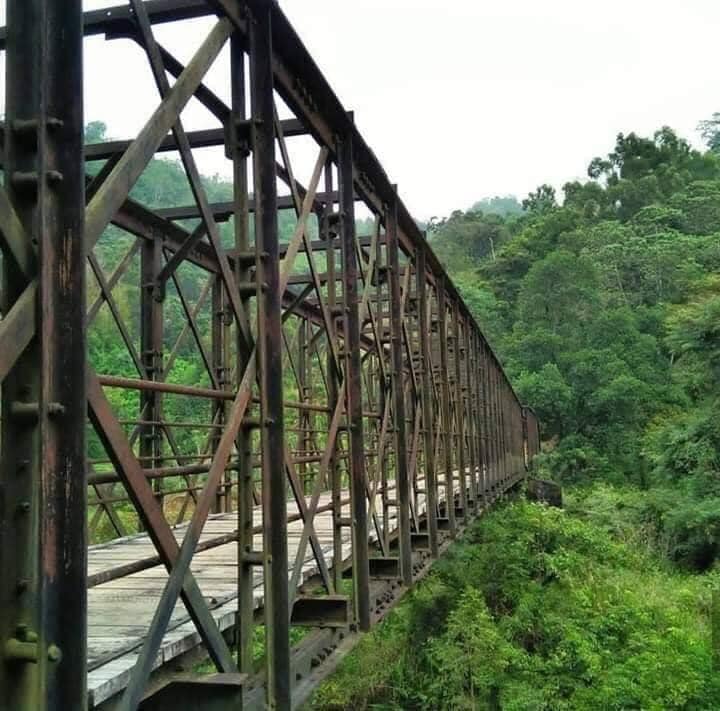Historic bridge over Uma Oya at risk of collapse
Built 160 years ago, the historic iron bridge, long a tourist attraction in the Badulla district, has been in a state of disrepair for over a year after part of it was swept away by bad weather. Local residents are protesting because during the rainy season they are forced to travel 70 kilometres to sell their vegetables at the market.
Colombo (AsiaNews) - The 160-year-old iron arch bridge that crosses the Uma Oya in Uva Paranagama, in the Badulla district of Uva province (built during the British colonial era to cross the Uma Oya in the middle of dense jungle), is currently in a state of disrepair, with rotten wooden planks posing a danger to those who use it.
The area is considered a tourist attraction, yet no measures have been taken to ensure the safety of tourists and residents. Hundreds of people use this bridge every day, putting their lives at risk.
A year ago, part of the bridge over the Uma Oya, located near the town of Welimada in the Nuwara Eliya district, was washed away by heavy rains.
The villagers are still waiting for a response from the authorities, hoping for the bridge to be rebuilt, but their appeals have so far been ignored.
According to residents, during election campaigns, politicians from all parties promised to restore the bridge to its original state, but once the elections were over, no one listened to their problems anymore.
The inhabitants continue to use a small damaged part of the bridge to cross.
The village of Welimadagama and the Sudharshanaramaya temple, connected by the bridge, represent an alternative route for residents (otherwise they would have to travel about 70 kilometres).
Crossing the bridge is therefore the shortest route, which is why residents continue to use it despite the risks. Currently, around 500-600 people cross the small damaged part of the bridge every day.
During the rainy season, residents have to take a longer and more winding route, spending between 400 and 800 rupees to transport their vegetables to the market.
Pregnant women find it difficult to cross the bridge and are often carried on the shoulders of young men from the village, putting their own lives at risk.
The bridge, which connects the electoral college of Uva Paranagama to that of Hali Ela, was built on a solid structure and used for a long time. It later became a tourist attraction thanks to the surrounding landscape.
According to a plaque near the bridge, the British restored it in 1919 and about ten years ago the wooden planks were replaced.
The bridge is used by the inhabitants of Uva Paranagama to reach the city of Badulla, while the residents of Hali Ela cross it to go to the central province, especially pilgrims visiting the Temple of the Sacred Tooth in Kandy.
Wijepala Herath (69), Gunawathie Ratnayaka (67) and Siyadoris Appuhamy (62) from Bambarapana spoke to AsiaNews about their situation: ‘Residents of 15 Grama Niladhari divisions use this bridge daily to reach the town of Welimada, the closest place to meet their daily needs, sell their crops and purchase essential goods. Across this bridge, we can reach Welimada in just 14 kilometres; otherwise, we would have to travel about 70 kilometres, taking about four hours. That is why we prefer to use the bridge.’
"Former Deputy Minister of State Chamara Sampath Dassanayake had allocated 4 million rupees from the decentralised budget for the renovation of the bridge, but the funds were returned to the Treasury as they were deemed insufficient for the work. However, they could have been used for at least a partial repair. Recently, several people have fallen from the dilapidated bridge and suffered serious injuries," Wijepala, Gunawathie and Siyadoris pointed out.
According to civil engineering professors Oshantha Dissanayaka and Roshan Samaradiwakara, ‘the collapsed bridge was four feet (approximately 1.2 metres) wide. Therefore, it is advisable to build a new one with a width of at least four metres, as the bridge is currently used by a large number of people, including local and foreign tourists.’
10/07/2023 16:45
24/01/2007







.png)










